Immigration

My kids are the great-granddaughters of Chinese immigrants, but until recently, I hadn’t shared much about our immigration story or been a vocal advocate for immigrant rights. Instead, like many evangelicals, I had absorbed hardline views on the subject.
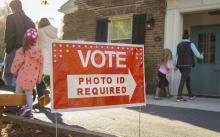
Immigration is never out of sight for those whose lives depend on it, even while it may have not been a topic of choice for presidential and vice-presidential debates this year. Candidates and lawmakers on both sides of the aisle have used the stories and experiences of immigrant people for political gain. But for many immigrant people, engaging in the larger immigration discourse and advocacy work is primarily about our families and our communities: their present reality and their future opportunities. It is not about touting a “welcoming” nature or defending a seemingly attacked territory or national identity as politicians and others have often approached it.

IN JUNE, NEARLY 700,000 DACA recipients could breathe a sigh of relief when the U.S. Supreme Court ruled against the Trump administration’s decision to rescind the Deferred Action for Childhood Arrivals program. The court determined that the basis for President Trump’s action was “arbitrary and capricious.” The grounds presented for termination failed to consider the impact of the program’s rescission, wrote Chief Justice John Roberts.
The grounds of the ruling are important because the court did not address whether DACA was legal. For now, DACA remains fragile. People who have benefited from the program, put in place by executive action under President Barack Obama in 2012, can continue to obtain valid work permits and are protected from deportation. An estimated 130,000 people would have been eligible to submit new applications for the program, except that the Trump administration released a memo on July 28 saying it would “reject all initial requests for DACA and associated applications for Employment Authorization Documents.”
This momentary reprieve and upsurge of hope resulted from decades of fierce social, political, and legal organizing by undocumented youth and their supporters, often at great personal risk. The Trump administration may decide to attack DACA again. It would likely be a costly undertaking since a substantial bipartisan majority of Americans support DACA.
While DACA prevents the eviction from the U.S. of a sector of immigrants, it does not dismantle the massive deportation machine that operates in this country nor create a pathway to citizenship—key components of comprehensive immigration reform. Authentic immigration reform begins with the recognition that U.S. immigration laws, from their inception, have been informed by discriminatory narratives. The first immigration law, the Naturalization Act of 1790, made it possible for those born elsewhere to become citizens—but only if they were “free white persons” (“white” meaning certain Europeans, and “persons” essentially meaning men), excluding enslaved people, Native Americans, those without property, most women, and all others not defined as white. Only property-owning white male citizens could vote.

Several Democratic senators grilled Customs and Border Protection Acting Commissioner Mark Morgan.

Even as we allow ourselves to savor this victory and be lifted by the hope of this moment, we also need to prepare and strategize for what’s next, because the fight for immigration justice is far from over. The justices of the Supreme Court did not rule on the merits of whether Trump is allowed to end DACA — but rather on the way in which he attempted to do so.
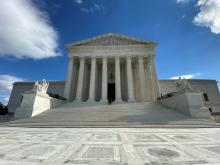
The U.S. Supreme Court on Thursday ruled against Donald Trump's bid to end a program that protects from deportation hundreds of thousands of immigrants, dubbed "Dreamers," who entered the United States illegally as children.

Like grocery store workers and first responders, domestic workers occupy a space on the frontlines of the pandemic. While some care for the elderly and people with chronic illnesses in their homes, others face dwindling job prospects, with little savings to stock up on the groceries and cleaning supplies Americans have flocked to stores for.

The administration is pursuing every tactic at its disposal – many of which have been temporarily stalled by the courts – to impede the path to citizenship and to reduce legal immigration avenues to the U.S.

Last week, just days before he addresses the nation in the State of the Union speech, President Donald Trump signed a proclamation that placed restrictions on nationals from Myanmar, Eritrea, Kyrgyzstan, Nigeria, Sudan, and Tanzania from traveling to the United States. The Department of Homeland Security said the restrictions will go into effect Feb. 21.
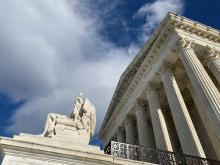
The Supreme Court gave the go-ahead on Monday for one of President Donald Trump's hardline immigration policies, allowing his administration to implement a rule denying legal permanent residency to certain immigrants deemed likely to require government assistance in the future.

Gov. Greg Abbott informed the U.S. State Department that Texas will not participate in the refugee resettlement program this fiscal year. The decision comes after more than 40 governors, including several Republicans, have said they would opt in to the federal refugee resettlement program. Resettlement agencies needed written consent from states and local governments by Jan. 21. The deadline was imposed in a September executive order by the Trump Administration that requires written consent from states and local entities before they resettle refugees within their boundaries.

Too often, we discuss immigration as if migrants were objects, not subjects in their own journey. Individual stories disappear into the rhetoric of “tens of thousands,” retreating into statistics’ deadening numb. Lost, too, is the depth of migrants’ faith; the courage to sojourn as a stranger in unknown lands, fueled by longing for a loving future.
Climate music, baby Yoda, women in church leadership, and more on this week's Wrap.

Cecilia Muñoz is one of the foremost experts on immigration in America today. In 2008, President-elect Barack Obama appointed her to his White House staff as the Director of Intergovernmental Affairs and later was appointed as Director of the Domestic Policy Council. The interview has been edited for length and clarity.
4. Pete Buttigieg on Faith 'As a Source of Unity' and Its Role in the 2020 Election
We have a form of kind of cheap nationalism that uses the idea of nationality to tell a lot of people that they aren’t your neighbor--even if they literally are your neighbor.
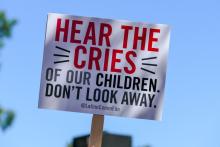
The United States, in particular, is abandoning our founding principles and those that have sustained our position as the aspirational bastion of freedom and opportunity. Our failure is reprehensible: Even as we fail to protect children, we are daily compounding their trauma and harm through policies detention and separation. History will remember the cruelty of this administration, the atrophy of moral leadership, and the apathy of the American people.
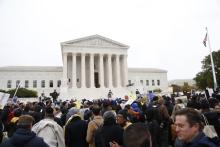
“Because of that program, I was able to buy a home, get a job and pursue a career,” Leezia Dhalla, who came to the U.S. with her family in 1996, at the age of six, said in an interview. Dhalla, who was among thousands of DACA supporters rallying outside the Supreme Court, said her family became undocumented because a lawyer mishandled their paperwork.

The DACA oral arguments drew thousands of protesters, DACA recipients, faith leaders, and organizers to the steps of the Supreme Court.

It’s a tragic fact that 75 percent of white Americans have no people of color in their social circles outside of work. Dr. Martin Luther King Jr.’s observation that 11 o’clock on Sunday morning is the most segregated hour of the week is still largely true. And if you’re only in a world that looks like you, then you aren’t going to understand Jesus’ answer to the question “And who is my neighbor?”

Regardless of the test result, an asylum seeker will have to attend a court hearing before an immigration judge. However, if she failed the test by not convincing the official that she has a “credible fear” of returning to her country, she has more to prove in the court hearing — or face deportation.